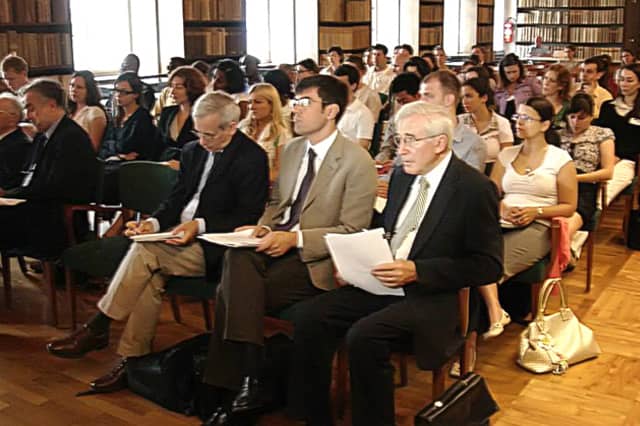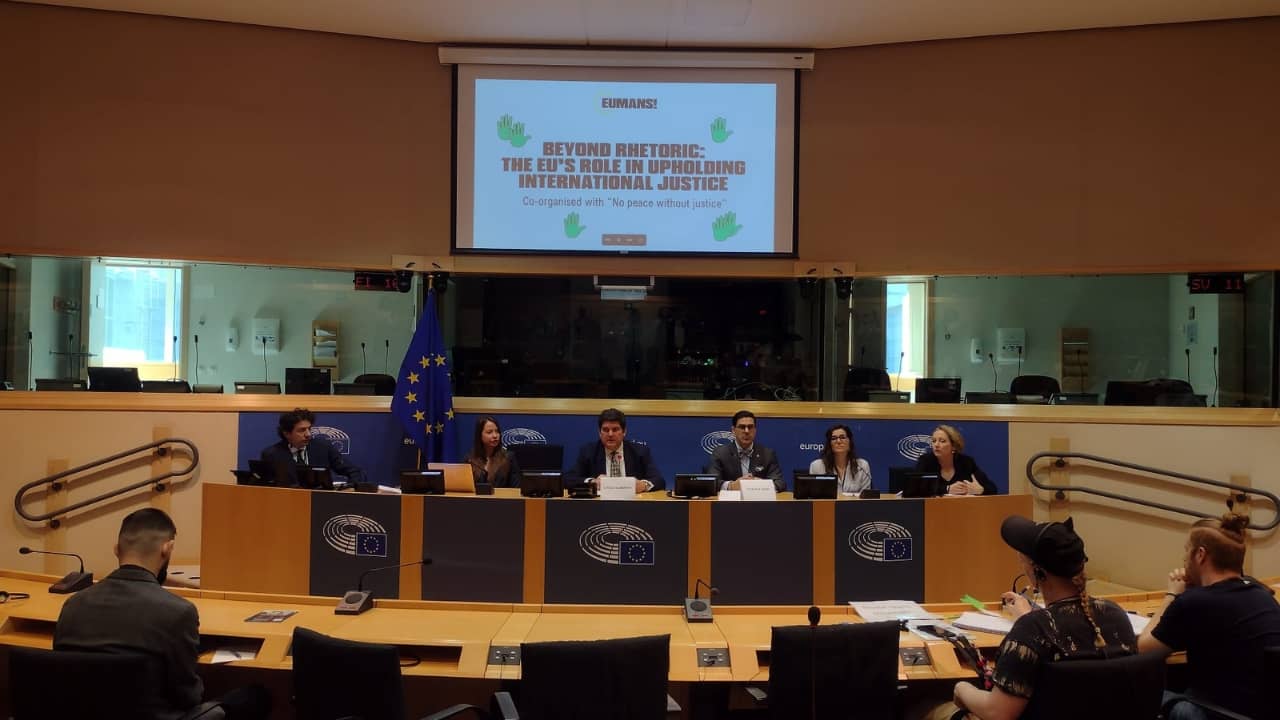
By David Donat-Cattin (Ph.D., Law), Secretary-General, Parliamentarians for Global Action
Earlier this month, on June 1, 2015, the world lost one of the most innovative and charismatic legal thinkers of our times, Professor Dr. Otto Triffterer. His “Commentary on the Rome Statute of the International Criminal Court” has been hailed as the most significant scientific work on the treaty that founded the new permanent system of international criminal justice.
Professor Otto Triffterer’s contribution to the progressive development of International Criminal Law dates back to the mid- 1960s when his pivotal Ph.D. thesis entitled, “Dogmatische Untersuchungen zur Entwicklung des materiellen Völkerstrafrechts seit Nürnberg” (“Theoretical Basis for the Development of Substantive International Criminal Law since Nuremberg”), marked a new beginning for the understanding of the principles established at Nuremberg. According to Triffterer, war crimes, crimes against humanity including genocide, and crimes against the peace (i.e. the crime of aggression) are crimes under international law, each State or international Courts and Tribunals exercise jurisdiction over them on behalf of the community of nations, and it is irrelevant whether domestic laws codify them for their application in a specific case concerning individual perpetrators and their victims. Hence, the legality of the Nuremberg Trials is explained as an exercise of the jus puniendi by the International Community as a whole to put an end to impunity for the crimes of concern to the International Community as whole, and not as a prolongation of national criminal jurisdictions through common Courts or Tribunals.
In the years leading to the establishment of the International Criminal Court (ICC) through the adoption of the Rome Statute, Prof. Triffterer contributed to shaping the general principles of law that have been incorporated in Part II of the Statute itself. Among his seminal writings, I will never forget the sense of wonder and the profound inspiration that I found when I read for the first time, “Acts of Violence and International Criminal Law. A New Position of Power to Fight Abuse of Power?”, which appeared in the Croatian Annual of Criminal Law and Practice in 1997. No other author had ever articulated such a comprehensive and systematic vision, based on protected interests and values reflected in the relevant norms and principles.
In my view, Prof. Triffterer was the only scientific author proposing a comprehensive theory concerning why and how to set up a permanent normative system of the most evolving branch of International Law in the 1990s, International Criminal Law. In 1995-97, I was the Director of the International Focus Program on ‘A Just World’ of the European Law Students Association (ELSA). I wrote to Prof. Triffterer seeking his support and cooperation as Dean of the Law Faculty and renowned scholar in the field of International Criminal Law, inviting him to host and open a Panel Discussion on the path towards a permanent ICC, on the occasion of our presidents’ annual meeting. Prof. Triffterer responded to the letter with a telephone call in which he offered the full support and partnership of his Faculty. When I informed the students in Salzburg of this good development, they could not believe it, as Prof. Triffterer was respected and regarded by them as the most severe and intransigent member of their Faculty. His speech on ‘A Just World’ was a major boost to the ELSA involvement in the ICC process, which led our student organization to join the Steering Committee of the Coalition for the ICC (CICC) and to have the largest NGO delegation at the Rome Diplomatic Conference of 1998, with more than 80 Members that participated in that historic event.
During the heated days of debate and negotiations in Rome, from 15 June to 17 July 1998, Prof. Triffteter was one of the few individuals who had no doubt that the Conference would have a positive outcome. I was surprised when he shared with me the concept of a Commentary to the Rome Statute, to be written immediately after the adoption of the treaty. As he asked me to indicate the Articles on which I would have wanted to write my commentaries, I replied, “Professor, I am truly honoured by your offer, but there is not an ICC Statute yet!” He looked at me, smiled and said with a very firm tone, “There will be one. Choose your Articles and let me know if you want to be part of the Project!” I immediately indicated the Articles relating to the rights of victims, which were part of my Ph.D. research at the University of Teramo with Prof. Flavia Lattanzi. Otto Triffterer was correct: the Rome Statute was eventually adopted, and there was an opportunity to write the first Commentary, that he modestly accompanied by the sub-title, “Observers’ Notes, Article-by-Article.”
Prof. Triffterer’s interaction with students brought about other new initiatives. After having attended the Arusha School on International Criminal Law, International Humanitarian Law and Human Rights (1995-1998 – a project that I coordinated with Thomas Henquet, Director for Human Rights at ELSA), a group of Salzburg students approached Prof. Triffterer to arrange a summer event of the same nature in his University, to which he readily agreed. The strength and determination of Prof. Triffterer made The Salzburg Law School (SLS) on International Criminal Law, International Humanitarian Law and Human Rights a place where some of the most dynamic and critical scholars and practitioners meet to debate developments, controversies and theories on the problems surrounding international and domestic efforts to put an end to impunity for the most serious crimes. This summer the SLS programme will celebrate its 17th anniversary.
Prof. Triffterer’s positions and writings represented in many circumstances a minority view, which, due to the strength of the arguments and their consistent and coherent rationale, eventually became majority positions and found recognition in international jurisprudence. His theory of the double-intent required for the crime of genocide, his reading of Article 27 of the Rome Statute on the principle of irrelevance of official capacity of Heads of States and other high officials as reflective of customary international law, and his clear characterisation of the elements of command responsibility are testament to a vision in which applying rigorously the principle of equality of all before the law can bring about prevention and deterrence, without waiting until international crimes evolve to the scale of mass-atrocities.
To defend the notion that genocide may be punished even after only one person is killed with genocidal intent (the intent to destroy a national, religious, ethnic or racial group as such, as a whole or in part), Prof. Triffterer once cited his memories as a 6 or 7 year old boy playing in a field with a view of the chimneys of a concentration camp: “When the smoke was coming up, we knew that the prisoners were taking the shower. If we knew, and we were small children, it meant that everybody knew, or should have known.” His theory was built on solid dogmatic grounds, as the special part of International Criminal Law (the definition of crimes) had always to be accompanied by a clear interpretation of the general part, the general principles of international criminal law, embedded in customary law stemming from the Nuremberg precedent.
The vision and legacy of Prof. Triffterer remains alive and continues to inspire the hundreds of students, researchers and practitioners whom he taught in Salzburg, Austria, and in all the German and international institutions, and who continue to read his writings today.
Prof. Triffterer leaves not only an extraordinary scientific and humane legacy, but also a wonderful family that has been close to him all these years, under all circumstances. To his wife, Maria, and his son, Tobias, may I express the dearest memory of their unique husband and father.
We honour the legacy of Prof. Triffterer most by reinforcing our rigorous commitment to put an end to impunity for the most serious crimes through the Rule of Law.




